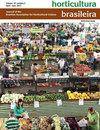Yield performance and agro-economic efficiency of radish-arugula intercropping under green manuring and planting density
IF 0.8
4区 农林科学
Q4 HORTICULTURE
引用次数: 0
Abstract
ABSTRACT The cultivation of radish with arugula in strip-intercropped systems is growing in semi-arid environments. The great challenge has been to assess whether there is agro-economic efficiency in the intercrops when fertilized with plant biomass of spontaneous species from the Caatinga biome. Thus, the objective of this study was to evaluate the productive and economic viability of radish and arugula strip-intercrops fertilized with Merremia aegyptia and Calotropis procera biomass equitable amounts from the Caatinga biome at different population densities of arugula at two cropping years. The experimental design used was randomized blocks, with the treatments arranged in a 4x4 factorial scheme, with four replicates. The first factor was constituted by four biomass equitable amounts of M. aegyptia and C. procera (20, 35, 50 and 65 t ha-1 on a dry basis), and the second factor by the population densities of arugula plants [40, 60, 80 and 100% of the recommended density for single crop (RDSC)] intercropped with 100% of the radish RDSC. The highest agro-economic advantages of radish and arugula intercropping were obtained for a land equivalent coefficient (LEC) and monetary equivalent ratio (MER) of 0.55 and 1.35, respectively, for M. aegyptia and C. procera biomass amounts of 54.75 and 54.55 t ha-1 added to the soil. The arugula population density of 100% of the RDSC provided the greatest agro-economic efficiency of the intercropped system of radish with arugula with LEC and MER of 0.58 and 1.33, respectively. The use of M. aegyptia and C. procera biomass from the Caatinga biome, proved to be a viable technology for producers who practice the cultivation of radish and arugula in intercropped systems in a semi-arid environment. The concern of the farmer regarding the preservation of natural resources, as well as with the search for a better quality of life, circumvents the possible limitations that the environment may offer in a given intercropping crop. The option by intercropping system can provide to producers viable alternatives to optimize the planted area, in addition to greater productivity and economic stability of activities on the rural property.绿肥和种植密度条件下萝卜-芝麻菜间作的产量表现和农业经济效益
摘要萝卜与芝麻菜在条间作系统中的栽培是在半干旱环境中进行的。最大的挑战是评估当与来自Caatinga生物群落的自发物种的植物生物量受精时,间作是否具有农业经济效率。因此,本研究的目的是评估在两个种植年份,在不同的芝麻菜种群密度下,用埃及Merremia aegyptia和Caltrophis procera生物量从Caatinga生物群落中受精的萝卜和芝麻菜条间作的生产和经济可行性。所用的实验设计是随机分组,以4x4析因方案安排治疗,有四个重复。第一个因素由埃及伊蚊和procera的四个生物量当量(干基为20、35、50和65吨ha-1)构成,第二个因素由芝麻菜植物的种群密度[40、60、80和100%的单作物推荐密度(RDSC)]与100%的萝卜RDSC间作构成。萝卜和芝麻菜间作的农业经济效益最高,土地当量系数(LEC)和货币当量比(MER)分别为0.55和1.35,向土壤中添加54.75和54.55t ha-1的埃及伊蚊和C.procera生物量。100%RDSC的芝麻菜种群密度提供了萝卜与芝麻菜间作系统的最大农业经济效益,LEC和MER分别为0.58和1.33。事实证明,对于在半干旱环境中在间作系统中种植萝卜和芝麻菜的生产者来说,使用来自Caatinga生物群落的埃及伊蚊和C.procera生物质是一种可行的技术。农民对保护自然资源以及寻求更好的生活质量的关注,规避了环境对特定间作作物可能带来的限制。间作系统的选择可以为生产者提供可行的替代方案,以优化种植面积,此外提高生产力和农村土地活动的经济稳定性。
本文章由计算机程序翻译,如有差异,请以英文原文为准。
求助全文
约1分钟内获得全文
求助全文
来源期刊

Horticultura Brasileira
农林科学-园艺
CiteScore
1.40
自引率
28.60%
发文量
45
审稿时长
4-8 weeks
期刊介绍:
The journal Horticultura Brasileira, a quarterly journal, is the Official Publication of the Sociedade de Olericultura do Brasil.
Its abbreviated title is Hortic. bras., and it should be used in bibliographies, footnotes, references and bibliographic strips.
 求助内容:
求助内容: 应助结果提醒方式:
应助结果提醒方式:


